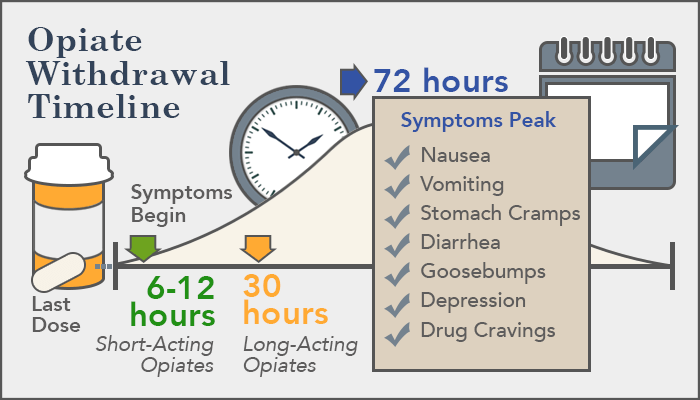Treatment Program For Opiate Addiction Treatment
A substance use disorder has more than one stage in its progression. It is important that you seek the level of care that your situation requires. If you do not, you will not attain the outcomes that you seek. Make sure to thoroughly consider your situation and research opiate addiction treatment. The better you are at selecting a proper course of treatment for opiate abuse at the outset, the more successful it will be.
What Is the Progression of a Substance Use Disorder?
All substance use disorders begin with abuse, which is defined as the use of any illicit drug. This means that any heroin use is abuse, as is nonmedical use of prescription opiates (even if they were attained legally).
After a period of use, people may develop a tolerance, which means that their bodies adjust to the opiates and thus they require larger amounts of the drug to achieve the same effects they previously enjoyed.
Next is dependence. After tolerance has set in, some people continue to use and their bodies begin compensating for the presence of the drugs in their system. Without the drug, the users brain and body don’t feel like they can function. This is what triggers withdrawal symptoms.
The final stage is addiction. At this point, as the National Institute on Drug Abuse notes, the drug seeking and use is no longer voluntary, it is compulsory, despite negative consequences brought on by use.
All of these stages need opiate addiction treatment.
So, Addiction and Abuse Aren’t the Same?
No. One is much farther along in the progression than the other and it requires more aggressive care. An addict will always begin as an abuser, but many abuser will never become addicts. According to the National Institute on Drug Abuse, 2.1 million Americans have a substance use disorder linked to prescription opiates and 467,000 have the same for heroin. All of those people aren’t addicts. Many of them are simply abusers.
What Happens If I enter Treatment for Opiate Abuse Instead of Opiate Addiction Treatment?
Your care won’t be intense enough. Abusers don’t need detox or intense therapy, but addicts do. In order to get the intensity of treatment you likely need, you must find a program aimed at addicts just like how to treat marijuana user.
I Can’t Go to Opiate Addiction Treatment Because I Own My Own Company; How Treatment for Opiate Abuse Caters to the Self-Employed
If you own your own business, you generally run the show. Without you at the helm, things could quickly spin out of control. In fact, the demands of your position and the stress associated with them may actually be what triggered you to use opiates in the first place.
When your opiate use progresses to the point of addiction, opiate addiction treatment is a must. But, how can you get the care you need when you can’t be absent from your workplace. If you are the sole employee, you can’t miss out on the pay while you go to rehab. Even if you have employees, you may still need to be involved for ordering, meetings, and staffing decisions. But, there are some options that will allow you to get the care you need.
Outpatient Opiate Addiction Treatment
Outpatient treatment may be the answer because you aren’t required to reside at the facility. You can come and go as you please. The only time requirement is that you attend your scheduled sessions. Otherwise, you can attend to business. Plus, they can work around your schedule.
There are some possible drawbacks. If you fear you cannot be left to your own devices without using, outpatient care may give you too much freedom. Further, if your addiction is particularly severe, you might need inpatient care to give you the full range of services required by your situation.
Executive Treatment for Opiate Abuse
If you have a bit more of a supervisory position within your business, executive rehab could be the answer you are looking for. This luxury rehab caters to business people by providing the things that they need to continue running things. You can expect”
- Computer access
- Wi-Fi
- Telephone access
- Conference rooms
- Office equipment
Get the Help You Need
If you still have reservations about getting help, you need to get past that. There is a treatment for opiate abuse option that will work for you. As things stand, if you continue using opiates, you are compromising your business and ensuring its destruction. Prevent that and get into rehab.
Treatment for Opiate Abuse Is Changing; The New Drugs Approved for Use in Opiate Addiction Treatment
All addictive substances affect different areas of your brain, but every single one of them has an effect on the reward centers of the brain. These areas release feel-good hormones that make us feel pleasure.
Previously, opiate addiction treatment was restricted to medications that also stimulated this area of the brain. Unfortunately, these drugs also allowed users to get high if they misused the meds. For example, common treatment for opiate abuse methadone is often criticized because patients can divert it to recreational use and it can lead to overdose. Despite the great outcomes associated with methadone treatment, this causes some people to see it as one addictive substance replacing another.
Newer medications don’t receive the same critical response.
Suboxone
In the previous year, physicians wrote 80,000 prescriptions for Suboxone, a blend of naloxone and buprenorphine used in opiate addiction treatment. The medication is popular because it eliminates cravings and withdrawal symptoms. Plus, it has a ceiling effect, which means that users cannot get high if the divert it. And, they cannot get high on other opiates while they are taking it. It is an ideal part of treatment for opiate abuse.
How Can I Get Suboxone Treatment?
Buprenorphine, naloxone, and Suboxone are all highly regulated. However, unlike methadone, they can actually be dispensed at a doctor’s office. The prescribing doctors are required to go through training before they can prescribe these medications. Less than 10 percent of the doctors in America have the credentials needed to prescribe Suboxone.
How Is Suboxone Administered?
The first appointment will last for a few hours, and you should receive medication during that visit. The doctor will want you to be experiencing withdrawal when you get your first dose, as it will trigger withdrawal in users. This also helps your doctor to figure out the best dosage.
You will visit the doctor a couple time during the first week and once a week thereafter until the dosage is worked out. After that, you may need to visit the office to get your medication. After a period of responsible use, you may receive medication from a pharmacy and be free to take it at home.


